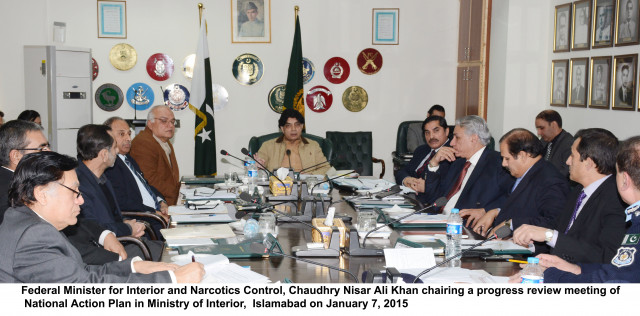Fresh revelations: Anti-terror plan fails to achieve goals
Interior secretary says implementation of NAP has been slow.

Interior ministry said that a comprehensive analysis is under way to identify how many of the proscribed groups are active inside or outside the country. PHOTO: PID
In a rare admission shortly after briefing a parliamentary panel along with the National Counter-Terrorism Authority (NACTA) chief, Interior Secretary Shahid Khan said that the 20-point National Action Plan (NAP) that envisages establishment of special courts for speedy trial of terror suspects and crackdown on jihadi outfits is not being executed at the required pace.
Highlighting the lacunas that prevent NACTA from functioning, the interior secretary informed lawmakers earlier this week that ‘dearth of funds’ was not the only hurdle that blocks the anti-terror body’s path.
Without delving into details, Shahid said that progress in particular areas outlined in the NAP had been dismal. But he pointed out that NAP is a set of recommendations and not a legislative draft.
He said the interior ministry would brief lawmakers on the procedural hurdles that have reduced NACTA, the top anti-terror body to a mere paper tiger.
Interestingly, despite the rhetoric to revamp existing mechanisms to deal with security threats, the government has also failed to establish a joint intelligence directorate.
The proposed directorate, which had to function under NACTA, was being set up for coordination and intelligence-sharing among 26 spy agencies to curb terrorism in the country.
Madaris
Adding their voice to the growing chorus of disappointment, senior interior ministry officials also admitted that progress in specific areas of the broad strategy focused on eliminating terrorism was dismal.
On reforms proposed for religious seminaries, commonly known as Madrassas, Interior Secretary Shahid Khan admitted that progress had been sluggish. However, he vowed that “We will make it effective.”
While the interior secretary promised effective progress on the issue, NACTA chief Hamid Ali Khan said that the government has been unable to gather exact data on the number of religious institutions in the county.
“The government, with the help of the National Database and Registration Authority (NADRA), has started geo-mapping of the Madrasas. Punjab has completed this exercise with the total number of 13,230 Madrasas while ICT has 450 Madrasas,” the NACTA chief said while briefing a parliamentary panel. He assured the lawmakers that the collection of data at district level to ascertain the exact figure of Madaris in the country had been initiated.
Terror funding
While briefing the parliamentary panel, Nacta chief also admitted that more needed to be done to clamp down on financers of sectarian and terrorist networks operating in Pakistan.
The anti-terror chief said measures to throttle terror financing and breaking terror communication network were being reviewed. He added that the anti-terrorism body’s strategy in this domain needed improvement.
Calling for better global coordination, he said “International cooperation is vital to block militant funding, slow cooperation has hindered progress.”
Afghan refugees
Highlighting the complexities that shroud the repatriation of Afghan refugees, the NACTA chief said that 19,000 immigrants living in Pakistan with illegal documents had been sent home under the NAP.
Similarly, he claimed that NADRA has also initiated the process to ascertain the burgeoning number of registered and unregistered Afghan refugees in Pakistan.
He further added that NADRA has been tasked to determine the status of refugees in the country and the ministry of foreign affairs has been directed to chalk out a comprehensive repatriation plan with the new government in Kabul.
"This is also an international issue," the NACTA chief said.
Forte
Trumpeting the anti-terror body’s efforts, NACTA chief claimed credit for the success in the ongoing operation to eliminate criminal elements in Karachi.
He also praised NACTA for spearheading the drive to authenticate subscriber identity modules (SIMs), launched in line with the NAP to counter terror activities in the country. Under the broad counterterrorism strategy, he said the country had executed several terrorist, who had dodged the justice system for decades.
Published in The Express Tribune, June 2nd, 2015.



















COMMENTS
Comments are moderated and generally will be posted if they are on-topic and not abusive.
For more information, please see our Comments FAQ